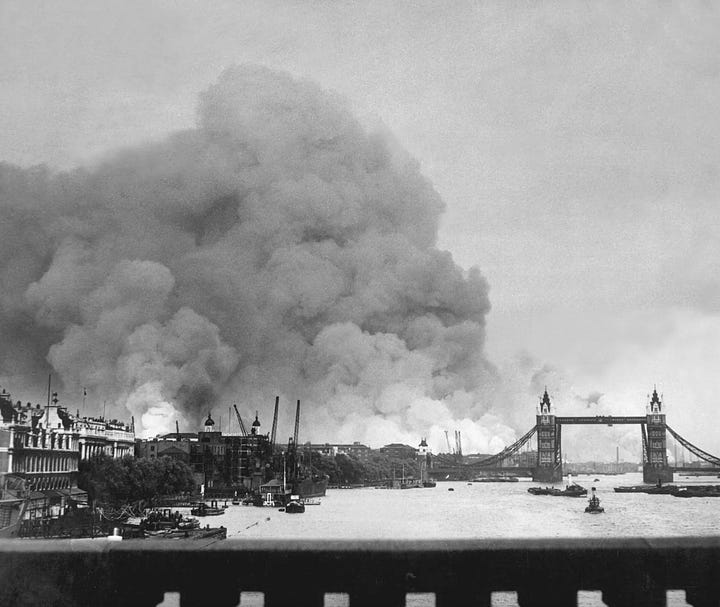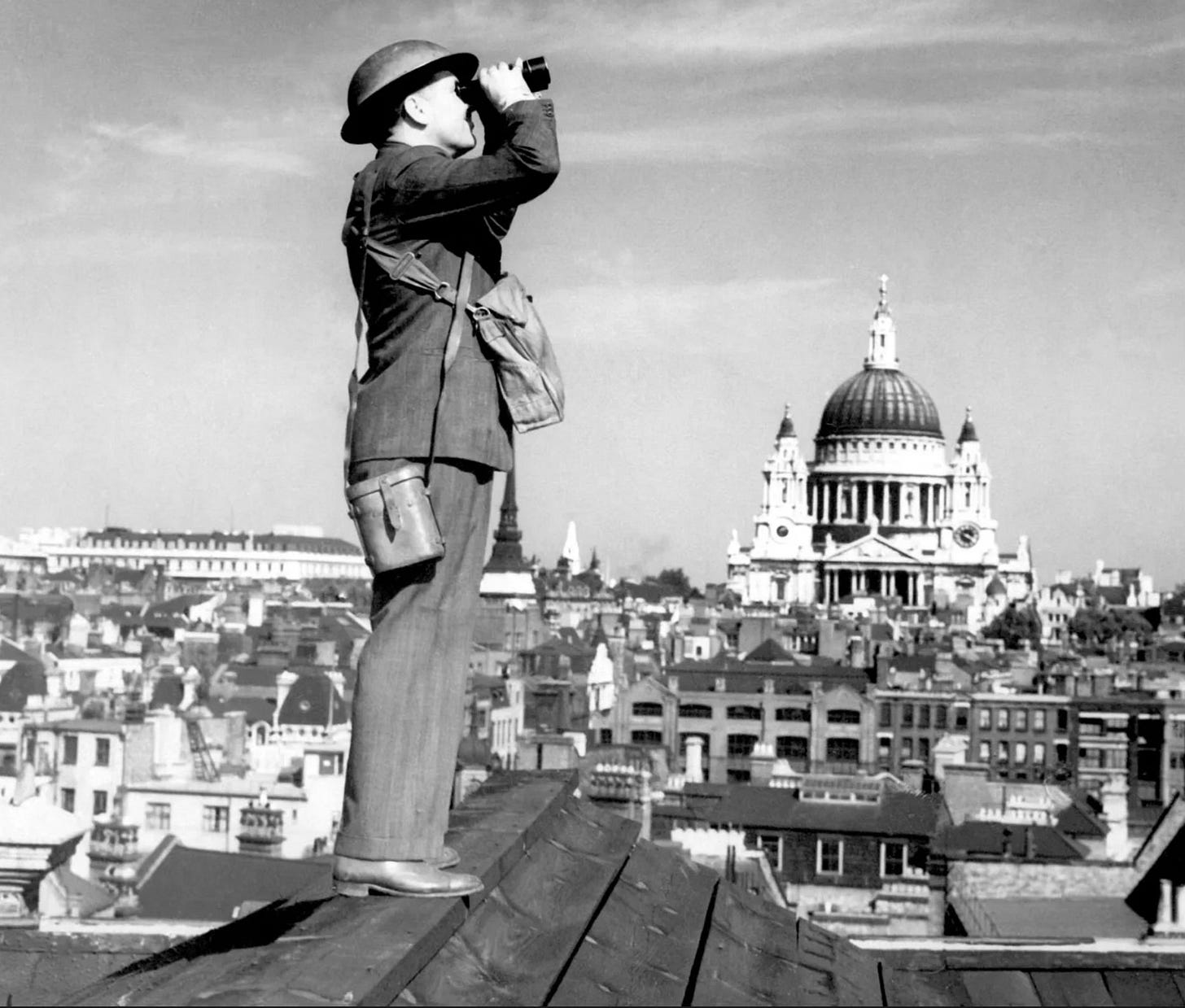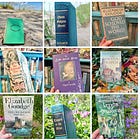"I like reading the history of heroic ages," said Miss Brown, "but I don't think I like living in them very much."
🌿 Elizabeth Goudge, The Castle on the Hill
Welcome to our March Goudge Readalong!
There is something very poignant about The Castle on the Hill, as you will undoubtably see this month in your reading of it. Goudge wrote it while history was still unfurling. She wrote with such hope and redemption, though they were still just in the beginning of the war.
Join us for a look at Britain in 1940’s, Goudge’s poem of introduction, and the castle that inspired her novel…
"The stage is undoubtedly overcrowded," said the man. "That is going to be one of our main difficulties. Yet if overcrowded it is finely set for one of the greatest dramas in all history. Don't you think so?"
🌿 Elizabeth Goudge, The Castle on the Hill
Setting: Britain, June 1940
Goudge chose to write her story from the current events of the day, and 1940 was quite the year for Britain! I thought it might be helpful to have a bit of a timeline just for that year. I have left out a great deal, choosing to focus on the items that are more relevant to the characters in our story.
“1940 in the United Kingdom was dominated by Britain's involvement in the Second World War, which commenced in September the previous year (1939), as well as the numerous enemy air raids on Britain and thousands of subsequent casualties. Although the war continued, Britain did triumph in the Battle of Britain and Nazi Germany's invasion attempt did not take place.”1
1940 Timeline
January: Britain calls up 2,000,000 19- to 27-year-olds for military service. Food rationing is introduced; it will remain in force until 1954.
March: Rationing of meat introduced.
May: Neville Chamberlain resigns as Prime Minister, and is replaced by Winston Churchill with a coalition war ministry. Winston Churchill makes his famous "I have nothing to offer you but blood, toil, tears, and sweat" speech to the House of Commons.
“…She had no illusions, now, about this war; how could she when she had seen pictures of dead children lying in the streets of Rotterdam? Churchill had left no room for illusion, either. Blood, sweat and tears, he had promised them…Yes, she'd done right to send the children away. Blood, sweat and tears were not for little children, only for their mothers. She made her tea, gulped it down and got up, straightening her shoulders. She was not afraid of what was coming. She could take it. She knew all about blood and sweat, and tears too, she who had borne seven children and lost three.”
May: Recruitment begins for a home defence force – the Local Defence Volunteers, renamed as the Home Guard from July.
May–June: The Dunkirk evacuation of British Expeditionary Force takes place. 300,000 troops are evacuated from France to England.
"We shall see," said Mr Birley grimly. "Now is the time of testing, now is the judgment, no less for nations than for individuals. We shall see… But there was Dunquerque."
June 10th: Italy declares war on France and the United Kingdom.
June 18th: Churchill makes his Battle of Britain speech to the House of Commons: "...the Battle of France is over. The Battle of Britain is about to begin... if the British Empire and its Commonwealth last for a thousand years, men will still say, This was their finest hour." He repeats the speech on BBC radio.
June: When our story The Castle on the Hill begins
“Miss Brown had come to play her part in the Battle of Britain within the shadows of a castle wall…”
July 19th: Adolf Hitler makes a peace appeal ("appeal to reason") to Britain in an address to the Reichstag. Lord Halifax, British foreign minister, flatly rejects peace terms in a broadcast reply on 22 July.
July: The Battle of Britain begins.2
August 18: "The Hardest Day" in the Battle of Britain: both sides lose more aircraft combined on this day than at any other point during the campaign without the Luftwaffe achieving dominance over the RAF. The Duke of Windsor is installed as Governor of the Bahamas.
August 20: Churchill pays tribute in Parliament to the Royal Air Force fighter crews: "Never in the field of human conflict was so much owed by so many to so few."
August 24: First air raid on London takes place.
September 7: The Blitz begins with "Black Saturday". This will be the first of 57 consecutive nights of strategic bombing on London. British high command issues the code "Cromwell" to troops, alerting them to possible German invasion.
September to May 1941: The Blitz, a large-scale night aerial attacks by Germany on Britain.
September 15: RAF command claims victory over the Luftwaffe in the Battle of Britain; this day is thereafter known as "Battle of Britain Day".
“For every family, for every nation, for every civilisation, there must come, at last, the end" (said Mr Birley.)
“Please God not yet," said Miss Brown, for once managing to say what she wanted to say with surprising fluency. "Not yet for England, and not yet for this heavenly place. England, now, is like this place. A castle set on a hill for all the world to watch."
September 17: Hitler postpones Operation Sea Lion, the planned German invasion of Britain, indefinitely. Battle of Britain officially ends at the end of October, though German bombing continues for the rest of the year.
October-December: Very heavy bombing of major cities all over Britain.
December: Heavy bombing in London causes the Second Great Fire of London.3


London in flames after bombing. Photos from Britannica
“He caught his shabby old coat on some barbed wire and Cursed angrily. Every reminder of the war made Mr Isaacson feel sick. Barbed wire entanglements in the streets of London, gun emplacements at street corners, barrage balloons in the sky, men in uniform, women in uniform, all dressed up as smartly as you please simply to kill and be killed in a hopeless struggle. ‘There'll always be an England,’ they were singing in the pubs and whistling on the streets, and would soon be hollering in the shelters when the bombs were falling. But Mr Isaacson doubted it. In his opinion the bleeding Germans had won this bleeding war and soon, if he did not make sensible use of that shilling, he would see in the streets of London what he had already seen in the streets of Vienna…”
🌿 Elizabeth Goudge, The Castle on the Hill
"No doubt you know that famous phrase, ‘History is the cordial of drooping spirits?’ " he asked her.
Miss Brown shook her head.
"A true saying," he said. "It's consoling to turn the pages of a history book and note how valiantly that man dared death and this woman endured persecution. They were of the same flesh and blood as you and I, and their dislike of living in history was probably just as great. What they can do we can do. We shall conquer fear as they did. Never doubt that."
🌿 Elizabeth Goudge, The Castle on the Hill
Goudge shared a poem about her own musings on Berry Pomeroy Castle to preface her tale. She has added a bit of memoir into it as well. Read the whole poem below which will inform us about how to think about her story:
Book Dedication: “To the Castle” by Elizabeth Goudge
“Hid deep in the heart of the woods, haunted and old,
The shell of a Castle still stands, a story told,
Built high on a rock in the woods, frozen and cold.
Deep are the night-dark shadows under the wall,
Breathlessly whispering downward the snowflakes fall,
Shrouding the desolate towers in a stainless pall.
Fearful within me my own heart, failing, has died,
I too in the woods am frozen, bereaved, sore tried.
Alone here… There in the shadows, who was it sighed?
There, in the bastioned walls where the gateway stands,
Are there shadows within its shadows, weaving the strands
Back through the loom of past sorrow with pain-worn hands?
Shadows weeping a world grown cold and stark with pain,
Mourning once more the lights put out, put out again,
The loveliness broken and lost, the young men slain.
Has sorrow alone lived here for a hundred years?
Is only hatred immortal, men's craven fears?
Only the weeping of women, their useless tears?
Not winter only reigns here in this haunted place.
As the cold clouds part, defeated, the sunbeams lace
The dark trees with their diamond light, touch the worn face.
Of the frozen stone with colour, with azure fire
Of spring-times long past, yet alive, the hot desire
Of summers never forgotten, hopes that aspire
For ever, courage unbeaten, valour aflame,
The unshaken victory of the men who name
Holy things to their strength… Nor fear, nor hate nor shame
Is theirs… I see the flashing of arms on the wall,
Hear the deep roar of the conflict, the thrilling call
Of the silver trumpet sounding high on the tall
Towers of God's immortal fortress, that he made
Against the evil out of the love of men laid
At his feet, their sweat, their blood to the last drop paid.
For this is the rock that for all time man defends,
The rock of his soul against which all evil spends
Its fury in vain in the warfare that never ends.
And these the embattled walls that the heroes trod,
Swift-winged with flame, their feet with the gospel shod,
For this is the house of all life, the house of God.
Lift up, lift up your constant hearts, the trumpet cries,
Lift them up to the shining walls, the sun-drenched skies,
For beyond the night for ever the sun will rise.”
Torhaven Castle (based on Berry Pomeroy Castle)
“Miss Brown, you in your boarding-house must have had great experience in housekeeping and in the handling of different types of humanity. Do you feel that you could take on the management of the Castle and its menfolk? The Castle is built on a precipice in the woods at the back of beyond, and it is very lonely there. We Birleys are notoriously difficult to manage, though we're nothing to Boulder and the dog Argos. The only thing that I think might attract you, lover of history that you are, is the Castle itself. It may be that you would like to see out the Battle of Britain in a fortress that has already withstood so many centuries of assault and siege. Its stout old walls that have endured so much and still stand, may comfort you as they comfort me."
There was silence in the railway carriage while Miss Brown, resolutely and successfully fought down her tears.
"Thank you" She said at last.
Her remark was inadequate, as usual, but it was the best she could manage at the time…
🌿 Elizabeth Goudge, The Castle on the Hill
Get your copy
You can find The Castle on the Hill in paperback at: Blackwells, Amazon, EBay, Thrift Books or Abebooks.
You are welcome to read at whatever pace you wish! But for our discussions we will cover:
Week 1: Chapters 1-4
Week 2: Chapters 5-8
Week 3: Chapters 9-11
Week 4: Chapters 12-15















My father was a soldier for the end of WWII and my maternal grandfather was not fit enough to be conscripted but was in France picking bodies up for burial from battlefields (he was in the Red Cross). My other grandfather was an engineer in WWI and an officer in the Home Guard in the second. My aunt was evacuated out to Buffalo and my mother to her gran in the countryside.
I had forgotten how much this shared history had impacted my childhood as the war was still very much present in peoples’ minds and in the landscapes where waste ground still showed where bombed houses had been, and the new temporary housing hastily put up and some are still used today.
I have read Castle on the Hill many times, but not recently. The opening chapters reminded me of my own family experiences and also reinforced the impact of the wars that are happening at the moment. The opening chapter was not a comfortable or easy read, despite the hope that EG embeds in her work.
I think many of us who will be reading along have family members who took part in this conflict. My uncles were in the military, one out in Egypt, one on the mine sweepers in the English Channel, another parachuted into France. My aunt was in the nursing corps . My father was just too young to participate, but had wonderful stories about being a young boy while the war was taking place. My mothers family who lived in the depths of the Essex countryside took in refugees. I was born only two years after rationing stopped.
Elizabeth was widely read, and naturally took a keen interest in the politics and policies that were enacted. She had a particular empathy with refugees, as home was so important to her. She found it particularly distressing that they had been uprooted from their culture, families and homes.